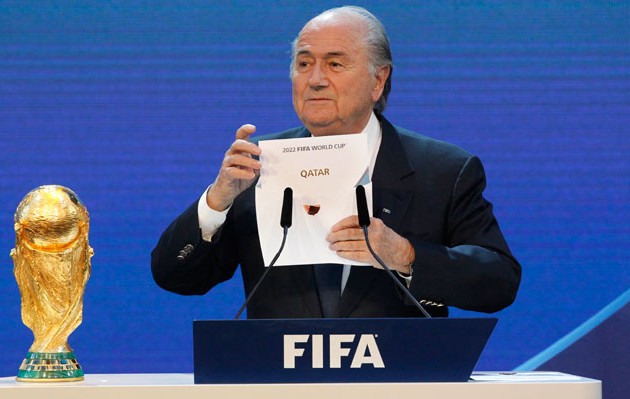FIFA Congress, perhaps reflecting the downbeat mood of uncertainty surrounding the 2014 World Cup, was not the anticipatory party of previous such events.
President Sepp Blatter confirmed a willingness to continue at the helm into the distant future and, along the way, threw out a bone of controversy in proposing managers’ rights to claim video reviews during a game.
Various essential items of business were wrapped up neatly but an undercurrent of irritation among the European delegates over Blatter’s change of heart over retirement appeared to infuse the entire proceedings.
Blatter, now 78, had told Congress in 2011 that this would be his last stint but the prospect of relinquishing power appeared to have grown increasingly distasteful. He has been retreating steadily from that stance and delivered final confirmation to delegates from the world federation’s 209 national associations.
“This Congress is not an elective congress,” he said, “although there has been sometimes the perception that we are going in an election. We are not but we are in a positive mood and I, personally, am in a very positive mood.
“I know my mandate will finish next year on May 29 in Zurich but my mission is not finished. Together we will build a new FIFA together. We have the foundations because we have the budget for the next four years, 2015-2018.
“You will decide who will take this great institution forward. It’s your decision to do so but I can tell you I am ready to accompany you in the future, for the game, for the world.”
Just about everyone stood but it was not a standing ovation merely a communal impatience among the delegates to exit the stifling conference hall.
Blatter had led much of the congress business from the beginning of the day including two other addresses. One, the welcome for delegates, even raised the prospect of Blatter extending his mission to other planets.
He said: “Football is not just a game . . . but a multibillion dollar business. It creates powerful opportunities but sometimes it creates controversial situations and some difficulties.
“So it is our duty to lead by example and to behave in an exemplary way . . If our basic values of football – discipline, respect and fair play – could be accepted everywhere in the world then I would say we have realised our objective.
“But the objective will never finish because our game, the game of the world, is empowering, is growing greater, is growing from north to west to east and south . . . and we shall wonder, one day, whether our game will even be played on other planets. Why not?”
Later Blatter even signified his conversion to the benefits of technology when he proposed a debate on whether managers should have the right to two video referee challengers per game.
For almost all of his 39 years in FIFA Blatter was a ferocious opponent of technological assistance for referees. His ‘Damascus moment’ was Frank Lampard’s ‘phantom goal’ at the 2010 World Cup. That prompted Blatter to change his mind and promote goal-line technology – to the frustration and irritation of UEFA president Michel Platini.
Now he wants to go even further and may well achieve his ambition since he promises to be around for a long time to come, particularly since Congress rejected – overwhelmingly – the concepts of age and term limits which were stragglers from last year’s reforms process.
This was another defeat for Platini since the European federation had wanted an age limit and a term limit for the president alone.
The precise count – taken on a show or green or red cards – was not announced by secretary-general Jerome Valcke; it was clear and sufficient that neither proposal had come anywhere near the 105 votes needed for a simple majority from the 209 member associations.
On the political front Congress cast responsibility on the Israeli government to commit itself to the attempt to ease the freedom of access issue with Palestine.
A Palestine Football Association threat last year to demand the suspension of Israel over the issue was not pursued but it took a close-run diplomatic effort to keep football’s own peace process alive.
An independent monitor or committee will be established to oversee the liaison system established last autumn by a FIFA task force led by president Sepp Blatter. It will be charged with reporting back to the executive committee in December.
Blatter had hoped that presidents of the football associations of Palestine and Israel could sign a memorandum of understanding ahead of Congress. But this proved impossible, despite Blatter’s best negotiating efforts last month with both Palestine President Mahmoud Abbas and Israel Prime Minister Benjamin Netanyahu.
Hence the proposal for an independent monitor to try to progress the process and then report back to the exco by the end of the year.
Blatter said: “Now we need the full support of the Israeli government in order to facilitate this move and this co-operation is crucial in this matter.”
The value of remaining in good standing with FIFA was underlined when the 209 national football associations were told they will reap a ‘bonus’ of $750,000 because of FIFA’s success in driving up the value of the World Cup.
The fact that a bonus was in the offing was no secret: Blatter had made a point of raising the expectations of each confederation in his addresses to them all over the previous two days.
However, within the formality of congress, it was financial director Markus Kuttner who had the responsibility of delivering the announcement and specifying the sums.
This, of course, freed Blatter from any accusation that he might be seeking political capital . . . just in case he were to consider running for president again next year.






